Welcome
to my Legislative E-Update
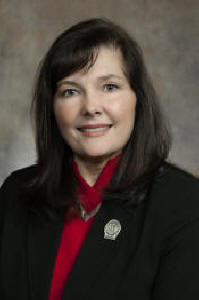 A
Welcome from Rep. Nancy VanderMeer A
Welcome from Rep. Nancy VanderMeer
I hope
everyone is enjoying the beautiful weather. It's been a busy few weeks since
the last update. I have been busy going to events, visiting with
constituents and touring local businesses. In Madison, the Assembly was on
the floor last week and I continue to work with my Assembly colleagues to
improve the proposed state budget. A lot has changed since I penned my
Budget Column that many of you hopefully had the opportunity to read.
This will be a good opportunity to fill you in on what's been going on.
Memorial Day
 Before
I begin with the update, I would like to remind everyone that Memorial Day
is on Monday. As most of you know,
Memorial Day is a holiday in the United States for remembering the people
who died while serving in the country's armed forces. Before
I begin with the update, I would like to remind everyone that Memorial Day
is on Monday. As most of you know,
Memorial Day is a holiday in the United States for remembering the people
who died while serving in the country's armed forces.
Whatever your
plans may be, make sure to remember that more than 1.2 million American
soldiers have perished as a result of military conflicts. Because of them,
we are able to live in a free society. It's important to take time to mourn
the loss of those men and women, as well as those who have passed on after
their military service ended. I hope everyone has a good Memorial Day
weekend!
Public Education is a Top Priority
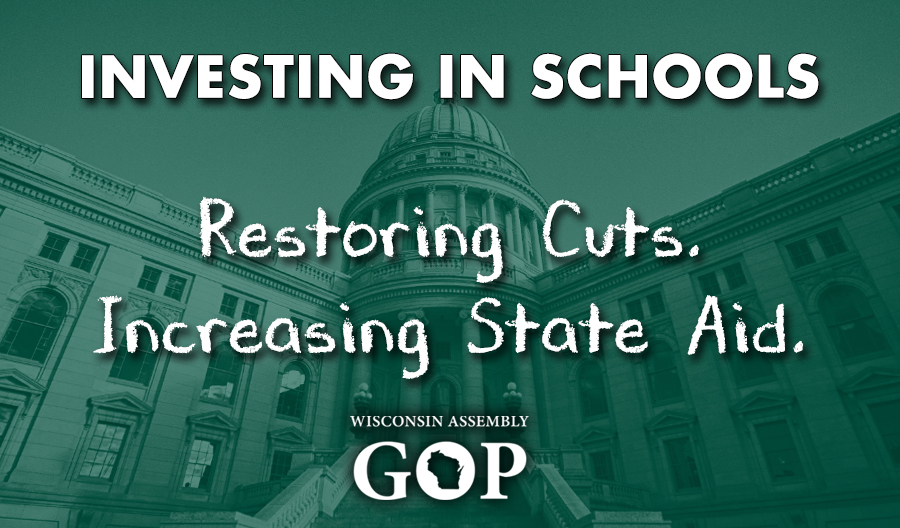
Joint Finance
Committee’s K-12 education funding plan that will restore funding by $150
per pupil in the first year and add an extra $100 per pupil in the second
year. That’s an added investment of over $200 million over the biennium.
This plan keeps our commitment to our local schools. We know that in order
for our children to have access to the best education, they need to be
provided with the necessary resources. Even though our state’s budget is
tight, my colleagues and I have made finding ways to invest in our public
education system our top priority. A strong education system translates into
a strong workforce equipped for the challenges of the 21st century economy.
I’m grateful that the leaders of the Joint Finance Committee responded to
the concerns of teachers, administrators and parents all across our state by
repealing the cuts to education included in Governor Walker’s budget. My
goal is that the final version of the state budget is one we can all be
proud of. Today’s action is a major step in the right direction as the
Legislature prepares to vote on the budget in the coming weeks.
Supporting Rural Schools
I am pleased
to see that the Joint Finance Committee has focused on rural initiatives to
help our students succeed. In the 70th Assembly District, our rural schools
face unique challenges due to geography, especially in the areas of
transportation costs and technology. Providing the necessary resources is
essential for rural schools to provide a quality education to our students.
Last session, the Assembly Speaker’s Task Force on Rural School was created
to study issues related to financial stability, declining enrollment,
transportation needs and other rural school issues. The bipartisan taskforce
submitted a report with numerous recommendations to Speaker Robin Vos
(R-Rochester) in the spring of 2014.
The following task force recommendations have now been approved by the JFC
to be included in the final state budget bill:
• Allow school districts to share certain grades without consolidation
• Encourage internet providers to extend high-speed internet access
throughout Wisconsin
• Create a new version of the TEACH program to provide digital learning
tools
• Increase funding for high-cost transportation aid by an additional $5
million
• Increase funding for sparsity aid by an additional $8.4 million
• Allow flexibility in teacher licensing to provide more technical education
classes
It's important that students in our rural district receive every opportunity
that is available to those who attend school in a more urban area. I commend
the JFC for recognizing how important these additional investments are to
the future of our young people, and I will continue to work with my
colleagues to stand up for rural schools.
Long Term Care Programs
FamilyCare & IRIS
I am happy to report that the Joint
Finance Committee’s has made the decision to repeal Governor Walker’s
Long Term Care proposal included in the 2015-2017 state budget. Ever
since the Governor introduced his budget plan, I’ve been working to
reverse these unnecessary changes to our state’s successful Long Term
Care programs.
In removing the Governor’s changes to FamilyCare and IRIS, the new
proposal gives the Department of Health Services limited authority to
negotiate with the federal government on potential changes to FamilyCare
to better integrate long term and medical care. The process would
include several notable components, such as: mandatory public and
stakeholder input, robust, self-directed care with budget authority,
preservation of ADRC services, and final approval of any federal waiver
applications by legislative Joint Finance Committee.
As a former board member of Handishop Industries, a community-based
organization dedicated to facilitating the developmental, social,
vocational, and transportation needs of people with special needs, I
know how important Long Term Care programs like IRIS are to individuals.
I’m glad to have been able to work with the Joint Finance Committee
members in making these changes.
SeniorCare
The Joint
Finance Committee voted to preserve and maintain current
funding
for the SeniorCare program during yesterday’s executive session. The
vote eliminated the governor's proposal to require SeniorCare
participants to purchase a Medicare Part D plan. The JFC also voted to
reject the governor's proposal to reduce SeniorCare funding by nearly
$94 million over the biennium. Additionally, the JFC froze the program's
enrollment fees and co-pays at the current levels.
Wisconsin
has a strong record of caring for our elderly and it’s clear that
SeniorCare is an essential prescription program for them. I am committed
to SeniorCare and am proud to have served as an influential voice in the
fight to protect this program for the senior citizens of the 70th
Assembly District.
Last
Week's Legislative Session

Wisconsin’s FoodShare Program
Last Wednesday,
the Wisconsin State Assembly was in session. I voted to reform Wisconsin’s FoodShare (food stamp) program to promote better nutrition and health.
The FoodShare
program will continue to help those truly in need with basic food
necessities, while at the same time reduce the abuse and misuse of this
program. Assembly Bill 177, requires recipients to make healthier choices
with their taxpayer-funded benefits. Two-thirds of FoodShare benefits will
have to be spent on foods that are part of the federal supplemental
nutrition program for women, infants and children (WIC. In addition,
recipients can purchase beef, pork, poultry, fish, potatoes and fresh
produce, as well dairy and cranberry products.
The intention
of this reform is to provide the best nutritional value of those who rely on
FoodShare to sustain their families with affordable, healthy meals. I am
glad we’re working to make this necessary reform a reality.
Just some related facts for you. Currently, nearly $74 billion is spent
annually on the food stamp program nationally; including $1.1 billion in
Wisconsin alone. Nationally, 1 in 7 people and 1 in 5 children (2013)
receive food stamps. The program’s cost has more than doubled in the last 4
years.
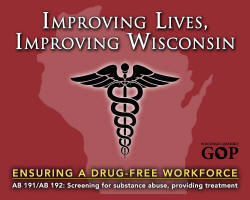 Promoting
a Drug-Free Workforce Promoting
a Drug-Free Workforce
I also voted
for two bills that will help individuals fight substance abuse and
ultimately, be ready for the workforce. Assembly Bill 191 and Assembly Bill
192 allow for screening of recipients on government job training programs
within FoodShare and Transitional Jobs or are receiving unemployment
insurance benefits. If there is a reasonable suspicion of illegal drug use,
the individual would submit to a drug test. Then, those who test positive
would receive the necessary treatment to help them become employable
citizens in Wisconsin. There are thousands of jobs available that are going
unfilled and these bills provide the funding and treatment for individuals
who need the help, which will then place them on a path toward employment.
Sparta
Bike Trail Flag Raising Ceremony
Recently, I had the honor of raising the
flags in Sparta for the Elroy-Sparta State Trail. This year, the
Elroy-Sparta State Trail is celebrating its 50th anniversary since its
establishment in 1965. The Elroy-Sparta State Trail is considered to be the
first rail-to-trail in the country, and its 32.5-mile route contains three
rock tunnels and passes through five small communities across Monroe and
Juneau counties.

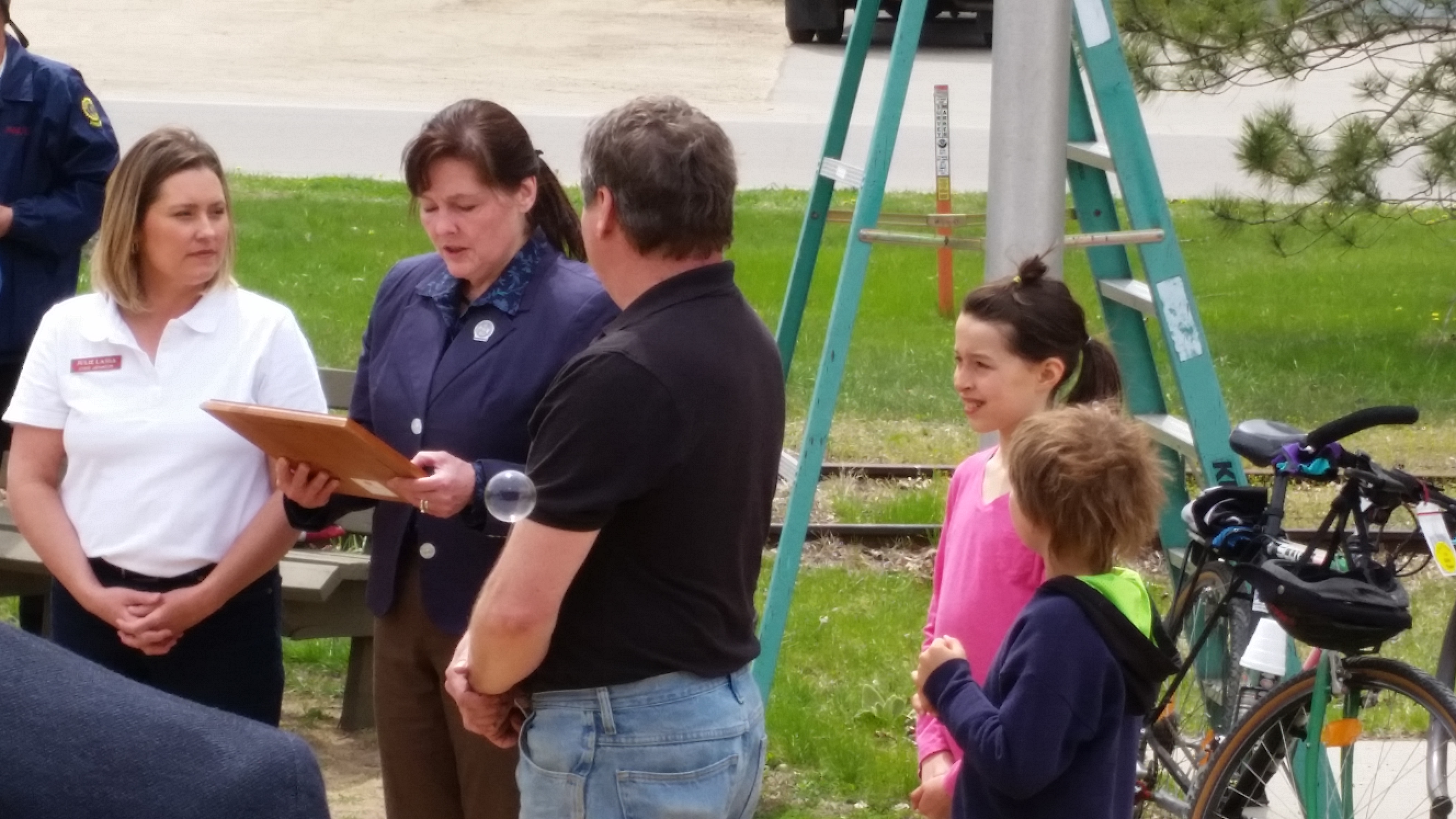
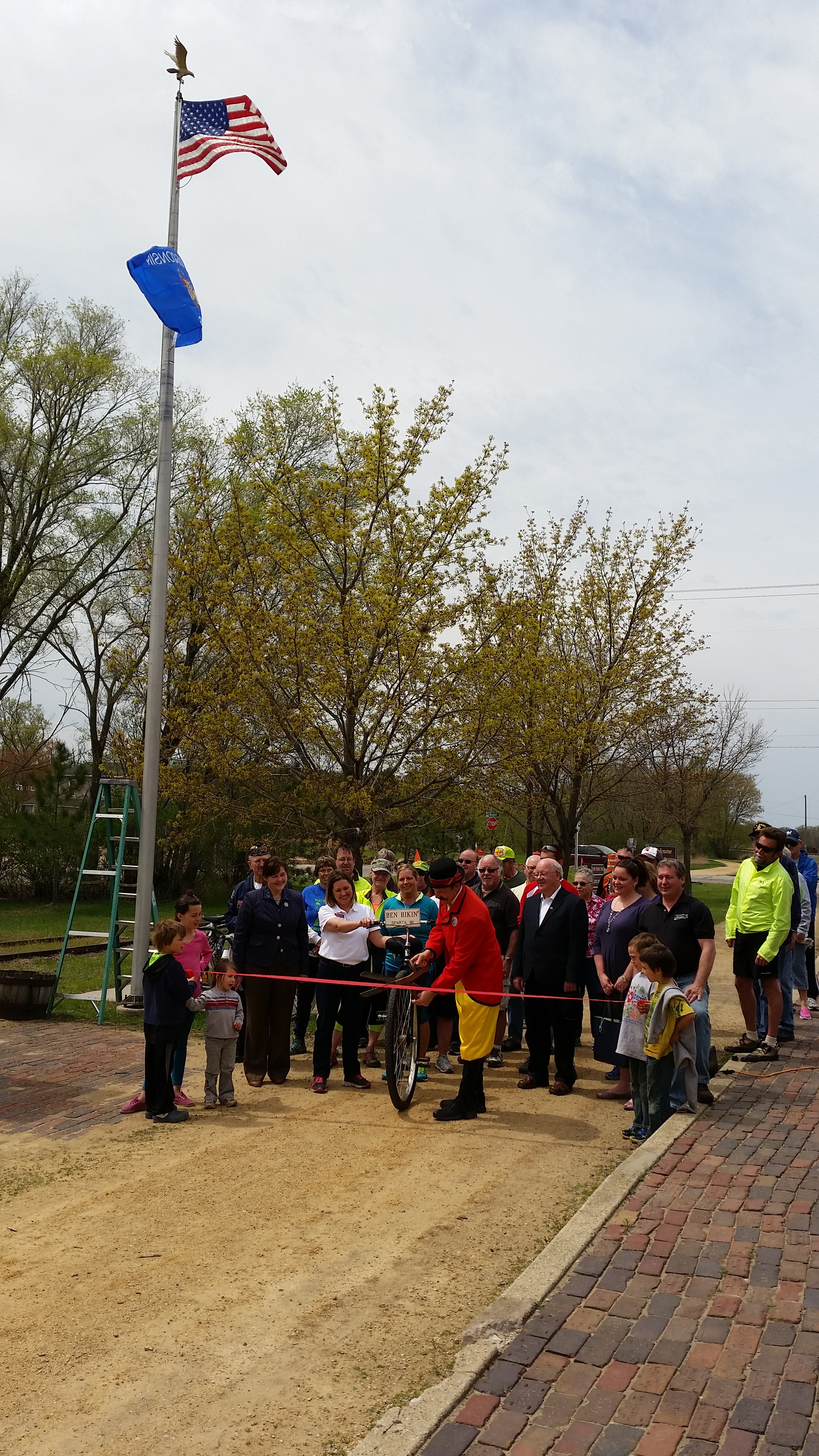
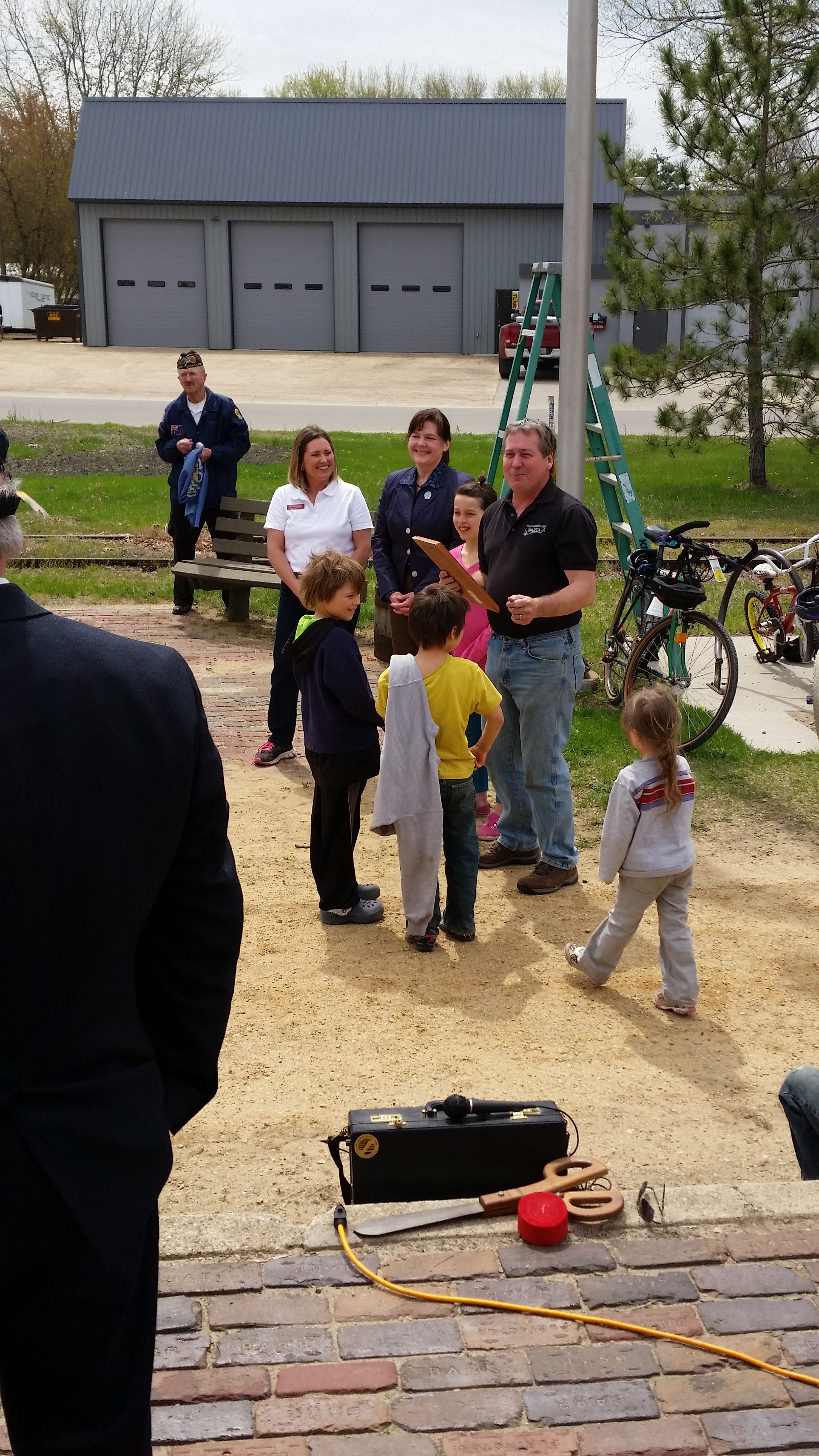
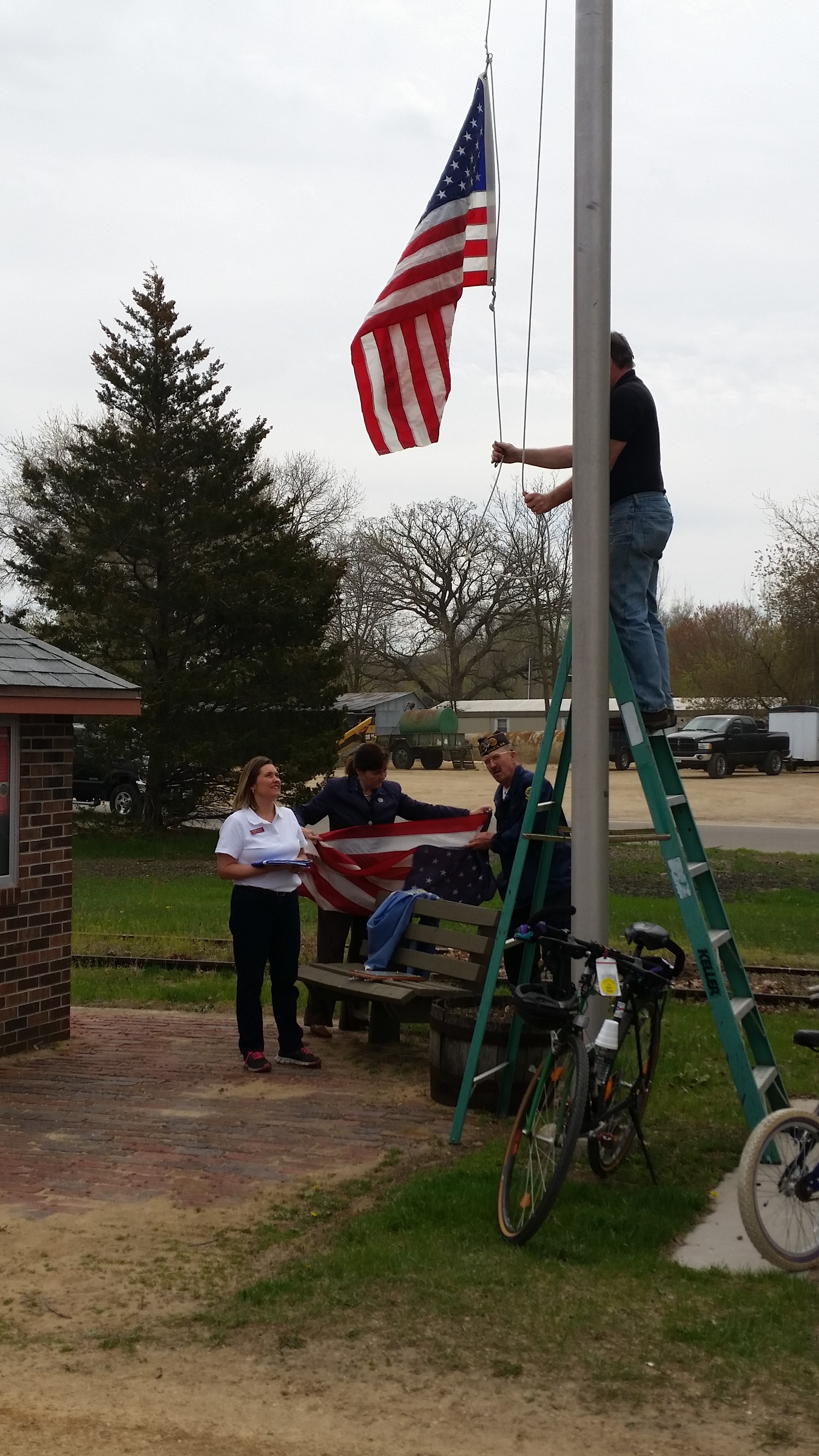
Elroy-Sparta
Bike Trail's 50th Anniversary Ride & Ceremony
On June 6th, the Elroy-Sparta Bike Trail's
will have its 50th Anniversary Ride & Ceremony. The celebration starts off
with the 50th Anniversary Bike Ride on the trail. 50 riders from each of the
5 communities along the trail - Elroy, Sparta, Kendall, Norwalk and Wilton -
will be part of the ride. You can join the ride free by registering on
www.50elroyspartabiketrail.com. Bicyclists will ride the trail in the
morning and then all will meet at Tunnel #1 between Wilton and Kendall for a
group picture. The 250 riders will ride together to Kendall at 1:30pm for
the 50th Anniversary Ceremony at the Kendall Depot at 2:00pm.
Featured speakers at the Ceremony include former WI Governor Tommy Thompson,
WI Department of Tourism Secretary Stephanie Klett, Kurt Thiede from the WI
Department of Natural Resources, and Friends of the Elroy-Sparta Bike Trail
President Dave Heilman. I hope to see you there!
Touring Alliant Energy & Cardinal
Glass IG
Recently, I had the privilege of meeting with
Alliant Energy employees at the company's Tomah Operations Center. I also
had the opportunity to meet with employees at Cardinal Glass IG and tour
their interior glass facility in Tomah, which is undergoing an expansion. It
was a great experience learning about two excellent local businesses in the
70th Assembly District. I
want to thank Alliant Energy and Cardinal
Glass IG for their hospitality!

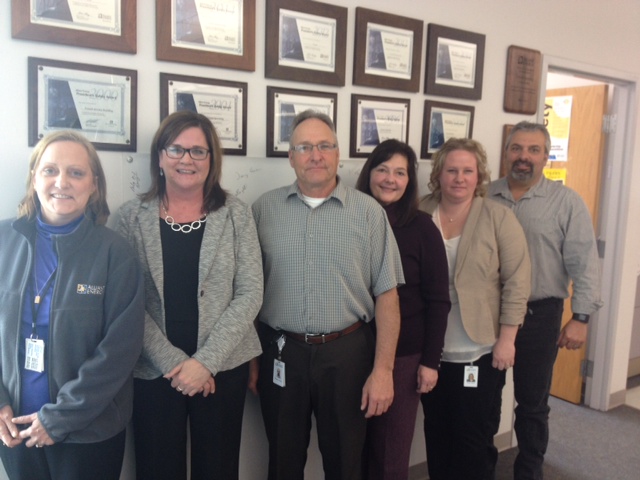

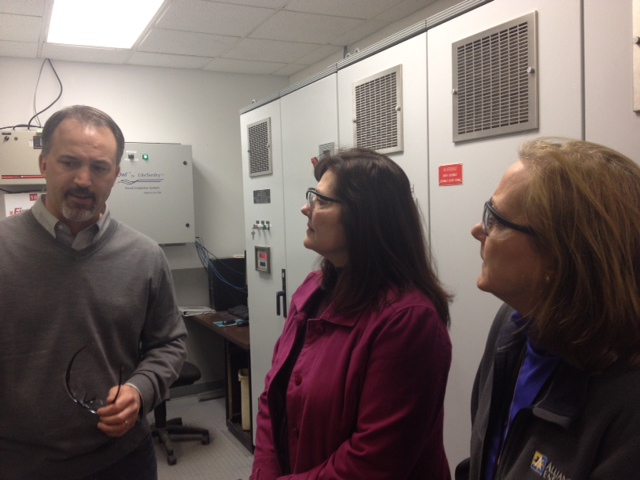

Sincerely,
 |

